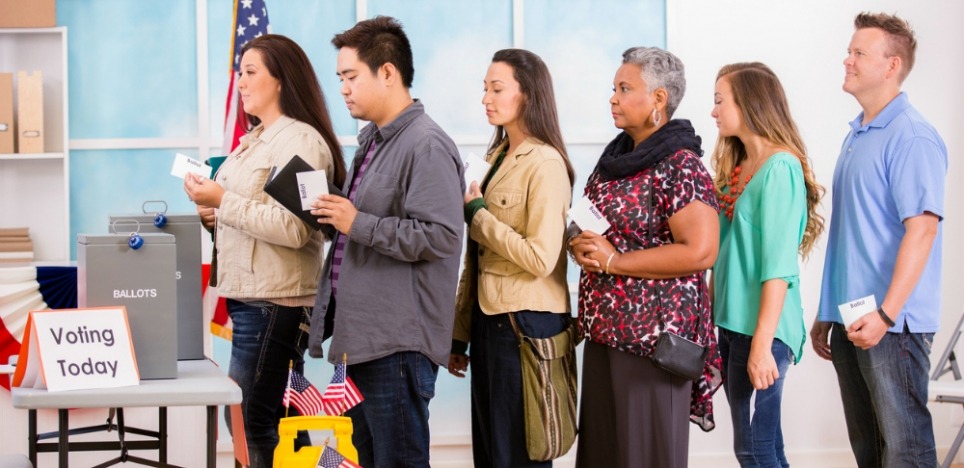The United States holds a presidential election every four years, elections for the House of Representatives every two years, and elections for one-third of the Senate every two years. Numerous local and state elections happen on the same date.
In 1845, the U.S. Congress cinched a uniform date for voting after the harvest but before winter storms came in earnest: on the first Tuesday after November 1. The choice of Tuesday kept voting day from falling on the Sabbath, but many working people have found it hard to get to the polls on a Tuesday. To help relieve this problem, voters' rights activists have advocated to make Election Day a federal holiday.
Originally, most states gave voting rights only to white male property owners age 21 or older. Gradually, four amendments changed federal law to expand voting rights:
- The 15th Amendment (1870) says no one can be denied the right to vote based on "race, color, or previous condition of servitude;"
- The 19th Amendment (1920) extended voting rights to women;
- The 24th Amendment (1964) ensured that no one could be kept from voting for not paying a polling tax; and,
- The 26th Amendment (1971) lowered the voting age to 18.
Obstacles to voting continue to be a concern for many segments of the population, such as prisoners, the homeless, and people in U.S. territories.
You can learn more about how to register to vote or update your voter registration, as well as find information about voting history and what's happening in state and local elections at the U.S. government Voting and Elections website. You can also visit the American Civil Liberties Union (ACLU) website to learn about the fight against voter suppression.
To Name This Day . . .
 Spiritual Practices
Spiritual Practices
Voting does what spiritual practices do: It asks you to get in touch with your authentic self and identify what is important to you. Voting connects you with your neighbors as you consider the programs and policies that affect all of you. And voting encourages you to consider the larger whole of which you are a part. An American motto is E Pluribus Unum — out of many one.
We encourage you to make these four voting-related spiritual practices your own and to share them with others:
- Citizenship Vow Ritual: Take time to consider what democratic values, virtues, and spiritual practices you want to express.
- Our Voting Companions: As you vote, bear in mind that you are never alone.
- Voting Ritual: Dedicate your voting hand to people and causes that are important to you.
- Voting as a Spiritual Practice: Dedicate the merit of your vote to a larger principle or cause by bringing practices such as compassion, hospitality, gratitude, kindness, listening, peace, reverence, justice, vision, and hope into the voting booth.
